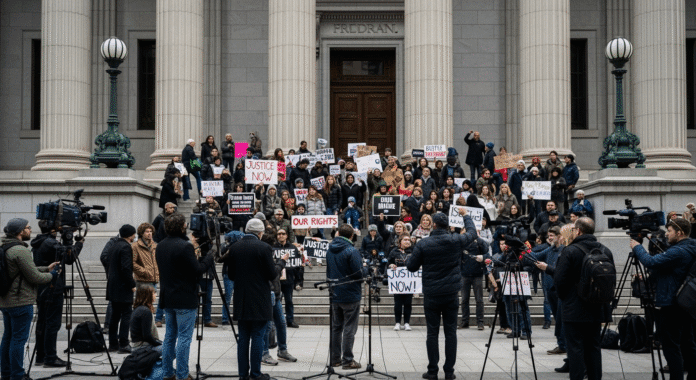Senate Confirms Emil Bove as Appeals Court Judge Despite Widespread Outcry
By David LaGuerre
Emil Bove’s Confirmation: Why It’s Stirring Outrage and Raising Red Flags
The U.S. Senate’s confirmation of Emil Bove—a former Trump attorney and senior Justice Department official—to a lifetime seat on the federal appeals court has ignited a firestorm of criticism. Many Democrats, legal experts, and over 900 former Justice Department lawyers and judges argue that Bove’s record and the rushed, partisan process that installed him threaten the integrity of the judiciary. The controversy centers on whistleblower allegations, concerns about Bove’s conduct at the DOJ, and what critics call a “rubber stamp” approach to Trump’s judicial nominees. Here’s why this matters for anyone who cares about democracy, justice, and the future of our courts.
Background: Who Is Emil Bove and How Did We Get Here?
Emil Bove’s legal career has spanned high-profile roles in both public service and private practice. After graduating from Georgetown Law, Bove clerked for federal judges and prosecuted terrorism and narcotics cases in the Southern District of New York. He later served as acting Deputy Attorney General under Trump and became a key member of Trump’s personal legal team, defending the former president in criminal cases involving classified documents and election interference (NYT).
But Bove’s tenure at the Justice Department was marred by controversy. He was involved in dismissing a federal corruption case against New York City Mayor Eric Adams and oversaw the removal of prosecutors working on January 6-related cases. These actions, combined with his close ties to Trump, have fueled concerns about his impartiality and fitness for the bench.
The Confirmation Process: A Partisan “Rubber Stamp”?
The Senate confirmed Bove by a razor-thin 50-49 vote, with all Democrats and two moderate Republicans (Susan Collins and Lisa Murkowski) voting no. The process was marked by:
- Whistleblower Allegations: DOJ lawyer Erez Reuveni accused Bove of instructing Homeland Security to ignore federal court orders on deportations, providing emails and texts as evidence. This raised alarms about Bove’s respect for judicial authority and due process (Washington Post).
- Dismissal of Corruption Case: Bove’s decision to drop charges against Mayor Adams led to resignations within the DOJ and allegations of political interference.
- Lack of Vetting: Despite these red flags, the Senate Judiciary Committee advanced Bove’s nomination without further investigation, prompting over 900 former DOJ attorneys and 75 former judges to sign an open letter opposing his confirmation (AP News).
Senator Dick Durbin called the process “a dark day for judicial independence,” while Senator Cory Booker lamented the Senate’s failure to act as a check on executive power.
Why Critics Say Emil Bove Is Unqualified
The opposition to Bove isn’t just about politics—it’s about principle. Here’s what makes his appointment so troubling:
- Abuse of Power: Bove allegedly pressured DOJ officials to drop cases and fired prosecutors who resisted, undermining the rule of law.
- Disregard for Judicial Orders: Evidence suggests Bove ignored court rulings, a direct threat to the balance of powers.
- Partisanship Over Principle: His close relationship with Trump and pattern of politically motivated decisions raise doubts about his ability to be an impartial judge.
As one former DOJ official put it, “This isn’t about ideology. It’s about whether we can trust our courts to be fair and independent.”
The Bigger Picture: Erosion of Judicial Independence
Bove’s confirmation is part of a broader trend. Under Trump, judicial appointments have become increasingly partisan, with nominees often confirmed on party-line votes and little scrutiny of their records. This “rubber stamp” approach undermines the Senate’s constitutional role and risks turning the judiciary into an extension of the executive branch.
- Potential for Corruption: When judges are chosen for loyalty rather than merit, the door opens to political interference and corruption.
- Loss of Public Trust: Polls from Pew Research and Gallup show that confidence in the courts is already slipping, especially when judicial decisions appear politically motivated (Pew Research).
Counterpoints: What Supporters Say
Supporters argue that Bove is a skilled prosecutor with a strong legal mind. They claim the allegations are politically motivated and that Bove’s experience makes him well-qualified. Some Republicans say the real issue is Democrats’ unwillingness to accept Trump’s right to appoint judges.
However, as legal scholars point out, the sheer volume and seriousness of the concerns raised about Bove set his case apart from typical partisan disputes.
What’s at Stake—and What Comes Next
The confirmation of Emil Bove is more than a political skirmish—it’s a test of our commitment to an independent judiciary. If we allow loyalty to outweigh integrity, we risk eroding the very foundations of our democracy.
As citizens, we must demand better from our leaders and our courts. The fight for a fair, impartial judiciary isn’t over. It’s up to all of us to stay informed, speak out, and hold our representatives accountable.
What do you think? Leave a comment below or share this story to keep the conversation going.



